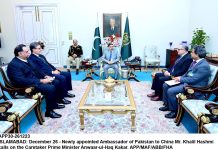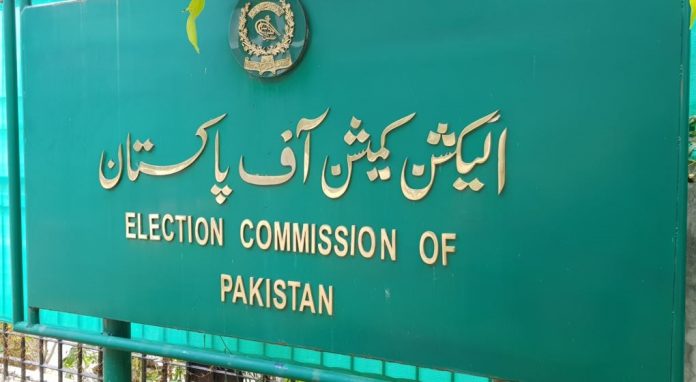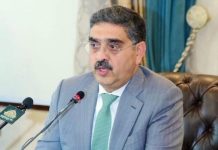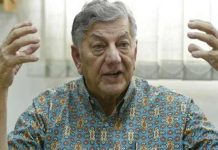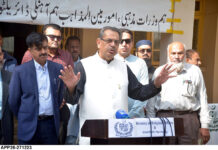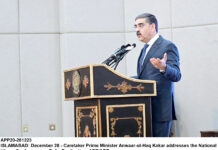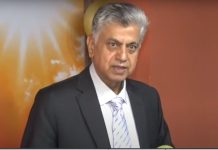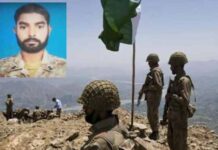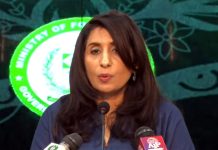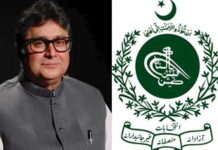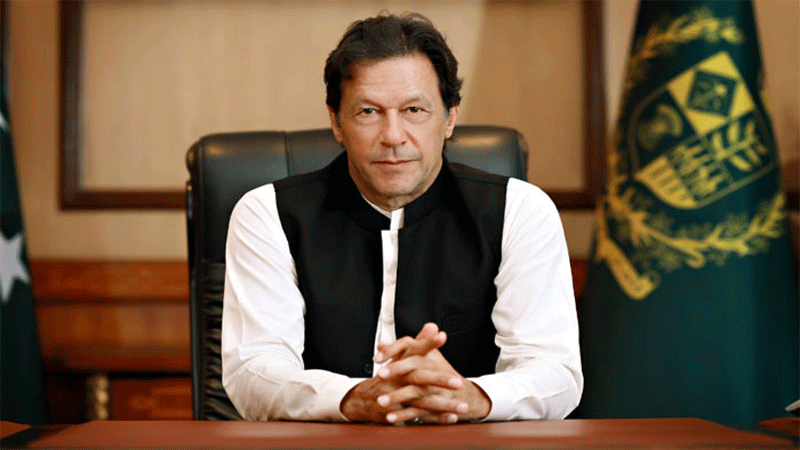
“The China-Pakistan Economic Corridor is a collection of projects in road, rail, energy and other fields, aimed at overcoming constraints and achieving growth,” he said while speaking at the Leaders’ Roundtable of the second Belt and Road Forum for International Cooperation here. “We are building highways, modernising railroads, setting up power plants, establishing a port, and establishing special economic zones. And a new port is connecting regions and eventually continents,” he added.
The prime minister said connectivity of Gwadar Port with China’s Xinjiang region will provide a shorter route for China’s imports compared to the South China Sea, reduce the cost for Chinese companies and develop western China as well. “China is a great success of the modern age, which achieved sustained growth, transformed society, improved the quality of life of a billion people. This transformation is due to the wisdom of China’s leadership and the hard work of the Chinese people,” he said. “Now President Xi Jinping has given the BRI vision, to break barriers, connect people, integrate economies and share prosperity,” he added.
The prime minister said in order to further boost connectivity and benefits under the BRI umbrella, further areas should be considered. “Digital connectivity and better sharing of information about business opportunities and lowest prices; mobility of labour and transfer of skills for cost-effectiveness; cultural links to assist the development of tourism which increases jobs and small businesses; knowledge and innovation connectivity to share best practices from BRI countries need to worked on,” he said. “For Pakistan, with its young population, future lies in developing skills and integration with the global economy,” he said. “To implement these additional areas of connectivity, I suggest that BRI countries should establish a BRI Tourism Corridor for cultural and tourism exchanges and develop programmes for improving the skills of labour from labour surplus countries to assist the labour-deficient countries,” he said, adding that creating multi-lingual digital platforms for connecting producers, consumers, and skilled job-seekers is highly necessary.
“Pakistan is at the cross-roads of important regions. Throughout our history, we have connected ideas, cultures, and commerce. Connectivity has been a part of our heritage and CPEC is giving it modern shape in the 21st Century,” he said. “As our region becomes more linked and prosperous, my expectation is that we will find it easier to find common solutions for longstanding problems,” he concluded.
Separately, Prime Minister Imran Khan along with his delegation met Vice President of China Wang Qishan here.
The vice president also hosted a banquet for the prime minister and the Pakistani delegation on behalf of President Xi Jinping.
The delegation included Minister for Foreign Affairs Shah Mahmood Qureshi, Minister for Railways Sheikh Rashid Ahmed, Minister for Water Resources Faisal Vawda, Minister for Planning Khusro Bakhtiar, Advisor on Finance Dr Abdul Hafeez Shaikh and Advisor on Commerce Abdul Razaq Dawood.
Prime Minister Imran Khan also held a bilateral meeting with Ethiopian Prime Minister Abiy Ahmed Ali on the sidelines of the 2nd Belt and Road Forum here on Saturday. The two prime ministers exchanged views on the broad range of bilateral matters.
Prime Minister Imran Khan underscored the importance Pakistan attaches to further intensifying multi-dimensional ties with the African Continent. Bilaterally, the prime minister proposed upgradation of political, trade, commercial and people-to-people contacts.
The two sides agreed to maintain regular high-level exchanges. Highlighting Pakistan’s participation in United Nations peacekeeping operations over the past several decades, Prime Minister Imran Khan stressed that Pakistan will continue to contribute to the cause of peace and security in Africa.
The prime minister is currently on a four-day visit to China for attending the second Belt and Road Forum and meet the Chinese leaders.
Besides Prime minister Imran Khan, President Ilham Aliyev of Azerbaijan, President Alexander Lukashenko of Belarus, Sultan Haji Hassanal Bolkiah Mu’izzaddin Waddaulah of Brunei Darussalam, President Sebastián Piñera Echenique of Chile, President Nicos Anastasiades of Cyprus, President Milo Zeman of Czech Republic, President Ismail Omar Guelleh of Djibouti, President Abdul Fatah Al-Sisi of Egypt, First President Elbasy Nursultan Nazarbayev of Kazakhstan, President Uhuru Kenyatta of Kenya, President Sooronbai Zheenbekov of Kyrgyz Republic, President Bounnhang Vorachith of Lao People’s Democratic Republic, President Khaltmaagiin Battulga of Mongolia, President Filipe Jacinto Nyusi of Mozambique, President Bidya Devi Bhandari of Nepal, President Rodrigo Roa Duterte of Philippines, President Marcelo Rebelo de Sousa of Portuguese Republic, President Vladimir Putin of Russia, President Aleksandar Vucic of Serbia, President Ueli Maurer of Swiss Confederation, President Emomali Rahmon of Tajikistan, President Shavkat Mirziyoyev of Uzbekistan, Vice President and Prime Minister Sheikh Mohammed bin Rashid Al Maktoum of the United Arab Emirates, Chancellor Sebastian Kurz of Austria, Prime Minister Hun Sen of Cambodia, Prime Minister Abiy Ahmed Ali of Ethiopia, Prime Minister Alexis Tsipras of Hellenic Republic, Prime Minister Orbán Viktor of Hungary, Prime Minister Giuseppe Conte of Italian Republic, Prime Minister Mahathir Bin Mohamad of Malaysia, State Counsellor Aung San Suu Kyi of Myanmar, Prime Minister Peter O’Neill of Papua New Guinea, Prime Minister Lee Hsien Loong of Singapore, Prime Minister Prayut Chan-o-cha of Thailand, Prime Minister Nguyen Xuan Phuc of Vietnam, and Vice President Jusuf Kalla of Indonesia attended the summit.


